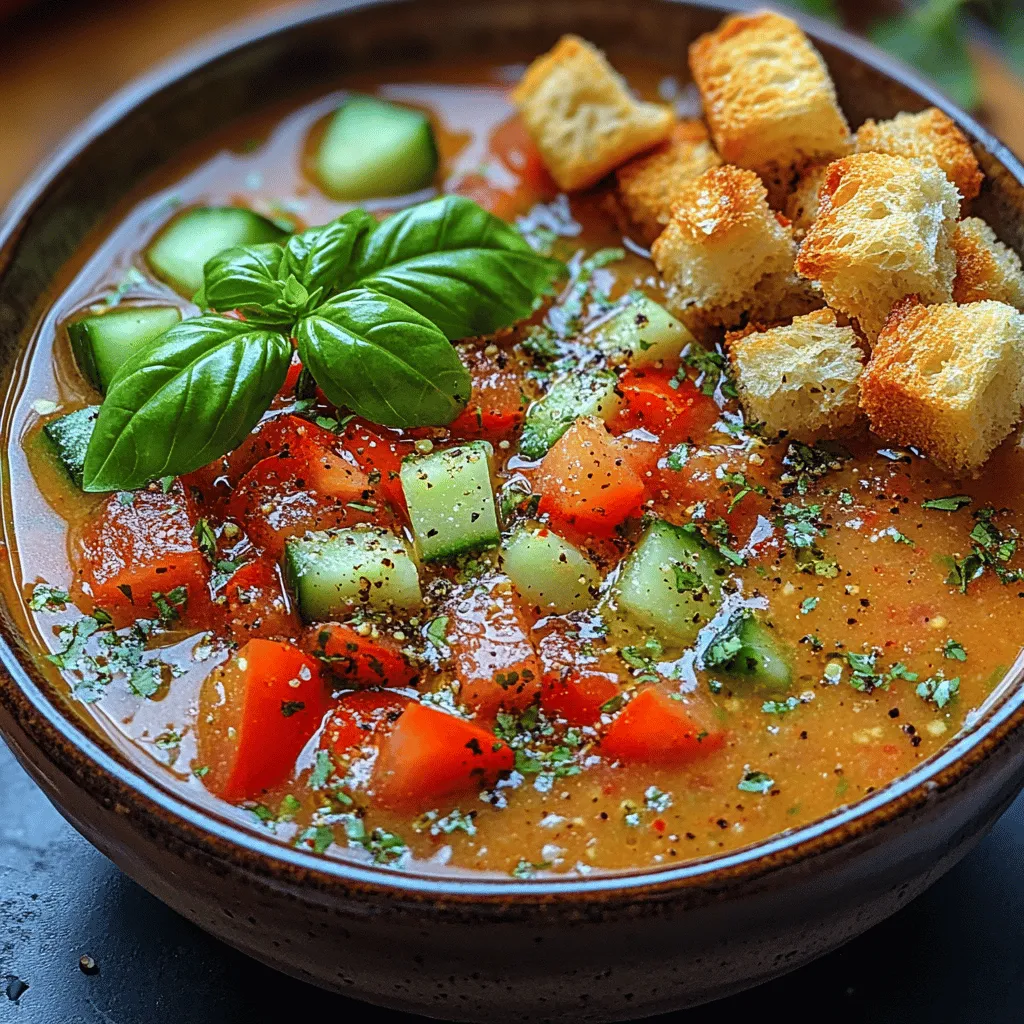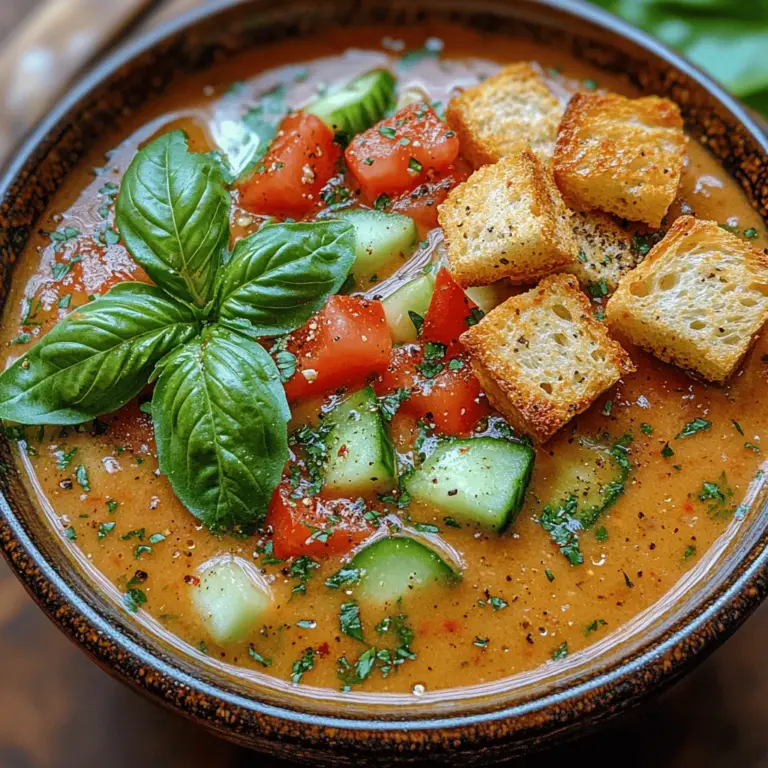As the summer sun blazes down, the search for light, refreshing meals becomes paramount. Gazpacho, a chilled soup originating from the sun-kissed regions of Spain, perfectly fits the bill. This quintessential summer dish not only provides a burst of flavor but also showcases the freshest seasonal produce. With its vibrant colors and invigorating taste, gazpacho is an excellent choice for those looking to enjoy a healthy yet satisfying meal during the warmer months.
The beauty of gazpacho lies in its simplicity, relying heavily on the quality of fresh ingredients. Using ripe, seasonal vegetables transforms this dish into a symphony of flavors, making every spoonful a delightful experience. This recipe for Refreshing Summer Gazpacho brings together a medley of garden-fresh ingredients, creating a dish that is not only refreshing but also brimming with nutrients.
Understanding Gazpacho
Historical Background of Gazpacho
The origins of gazpacho can be traced back to the Andalusian region of Spain, where it was born out of necessity. Traditionally, it was a way for farmers to make use of stale bread and surplus vegetables, blending them into a nourishing soup that could be consumed cold. The dish evolved over time, incorporating different regional ingredients and flavors, but its essence as a refreshing summer staple remained intact.
While the classic gazpacho is tomato-based, various adaptations have emerged across the globe. From the creamy, white gazpacho made with almonds and garlic in Andalusia to variations featuring fruits like watermelon or mango, the versatility of this dish is truly remarkable. Each region adds its unique touch, but the fundamental idea remains: a cooling dish that celebrates the harvest of summer.
Nutritional Benefits of Gazpacho
Gazpacho is not only a feast for the eyes but also a boon for your health. Packed with vitamins and minerals from fresh vegetables, this chilled soup is a low-calorie option that promotes hydration—a critical factor during the hot summer months. The main ingredients of gazpacho, such as tomatoes, cucumbers, and peppers, are rich in antioxidants and fiber, making this dish an excellent choice for anyone looking to boost their nutrient intake while keeping things light and refreshing.
Furthermore, the inclusion of healthy fats from olive oil and the potential for added protein from crusty bread croutons enhances its nutritional profile. Gazpacho can easily fit into various dietary preferences, including vegetarian and gluten-free options, making it a versatile dish for gatherings or outdoor barbecues.
Ingredients Breakdown
To create the perfect bowl of Refreshing Summer Gazpacho, it is essential to use high-quality, fresh ingredients. Each component plays a significant role in developing the soup’s flavor profile and texture. Below is a detailed breakdown of the ingredients that will bring this delightful dish to life:
Ripe Tomatoes
Ripe tomatoes are the heart of any gazpacho recipe, providing natural sweetness and acidity that form the base of the soup. When choosing tomatoes, opt for those that are deeply colored and slightly fragrant—these are often the juiciest and most flavorful. Varieties such as heirloom or vine-ripened tomatoes work exceptionally well in this dish, imparting a rich, robust flavor that truly shines through.
Cucumber
Cucumbers add a refreshing crunch and a hydrating quality to the gazpacho. They are low in calories and high in water content, making them an ideal ingredient for a summer dish. When selecting cucumbers, look for those that are firm and unblemished. The skin adds essential nutrients, so consider using organic cucumbers when possible, as this will ensure you are getting the most out of this nutritious vegetable.
Red Bell Pepper
Red bell peppers introduce both sweetness and vibrant color to the gazpacho. Their natural sugars balance the acidity of the tomatoes, while their bright hue creates visual appeal. Rich in vitamin C and antioxidants, red bell peppers boost the dish’s nutritional value. When preparing the gazpacho, remove the seeds and membranes for a smoother texture, allowing the sweet flavor of the pepper to shine.
Red Onion
While onions can sometimes overpower dishes, red onions offer a milder flavor that complements the other ingredients beautifully. Their subtle sweetness and slight bite enhance the overall taste of the gazpacho without dominating it. When chopped finely, red onions contribute to the soup’s texture and provide a hint of flavor that rounds out the dish.
Garlic
Garlic is a powerful flavor booster that adds depth to the gazpacho. Its pungent kick elevates the other ingredients, creating a well-rounded flavor profile. For a milder taste, consider using roasted garlic instead of raw, as it mellows out the sharpness and provides a rich, caramelized flavor. However, if you prefer a more robust garlic presence, fresh garlic will do the trick.
Tomato Juice
To enhance the tomato flavor and provide a smooth texture, tomato juice serves as an essential ingredient in this gazpacho recipe. It not only intensifies the tomato base but also helps to create a cohesive blend of flavors. Choose a quality tomato juice, preferably low-sodium, to maintain control over the seasoning of your dish.
Red Wine Vinegar
Red wine vinegar adds a tangy punch that balances the sweetness of the vegetables. Its acidity brightens the flavors and gives the gazpacho a refreshing lift. When incorporating vinegar, start with a small amount and adjust to taste, allowing the flavors to meld beautifully without becoming overpowering.
Olive Oil
A drizzle of olive oil enriches the gazpacho with healthy fats, enhancing both flavor and texture. Choose a high-quality extra virgin olive oil for the best taste. The richness of the oil will create a luxurious mouthfeel, while also providing heart-healthy benefits. A few drops of olive oil on top of the finished gazpacho not only adds flavor but also enhances the visual appeal of the dish.
Worcestershire Sauce
While not traditionally found in all gazpacho recipes, Worcestershire sauce adds a layer of umami complexity that can elevate the dish to new heights. This fermented condiment introduces depth and richness, enhancing the overall flavor. Use sparingly, as a little goes a long way, and adjust according to your taste preferences.
Fresh Basil
Fresh basil serves as a fragrant garnish that brings brightness to the gazpacho. Its aromatic qualities complement the other ingredients and provide a delightful finishing touch. When selecting basil, look for vibrant green leaves, avoiding any that are wilted or discolored. A gentle chiffonade or torn leaves can be scattered on top just before serving, allowing the aroma to waft through the air.
Crusty Bread
Crusty bread is often used to create croutons that add a contrasting texture to the gazpacho. The crunchiness of the croutons complements the smoothness of the soup, providing a satisfying bite. Choose a hearty bread, such as a rustic sourdough or baguette, and toast it until golden for the best results. These croutons can be served on the side or added directly to the gazpacho for a delightful crunch.
In the following sections, we will guide you through the step-by-step process of preparing this Refreshing Summer Gazpacho, ensuring that you can create a dish that not only tastes amazing but also captures the essence of summer in every bowl. Stay tuned for the detailed instructions and tips to achieve the perfect gazpacho that will impress your family and friends while keeping you cool and refreshed!

Step-by-Step Preparation of the Gazpacho
Preparing the Gazpacho Base
Creating a delicious gazpacho begins with the careful preparation of its base. Start by ensuring all your vegetables are washed thoroughly. The freshness of the ingredients is crucial for achieving that refreshing taste. You will need ripe tomatoes, cucumbers, bell peppers, red onions, and garlic.
Chopping Techniques: Use a sharp knife to chop your vegetables into smaller, uniform pieces. This not only helps in blending but also ensures that the flavors meld together nicely. For tomatoes, removing the core can enhance the smoothness of your gazpacho. The idea is to maintain a balance of size to ensure even blending.
Blending for Texture
Once your vegetables are prepared, it’s time to blend them. Use a high-speed blender and add the chopped vegetables in batches if necessary. Start with the tomatoes as they provide the liquid base, followed by cucumbers, peppers, onions, and garlic.
Achieving the Right Consistency: The goal is to blend until smooth, but some people prefer a bit of texture in their gazpacho. Blend for about 30 seconds to start, then check the consistency. If you desire a smoother texture, continue blending in 10-second increments until you reach your desired finish. Remember, a gazpacho should be refreshing and light, not overly thick like a puree.
Combining Flavors
Once blended, transfer the mixture to a large bowl and stir in the olive oil, red wine vinegar, salt, and pepper. The combination of these ingredients adds depth to the gazpacho.
Refrigeration Enhances Taste: Cover the bowl with plastic wrap and refrigerate the gazpacho for at least 2 hours before serving. This chilling time is essential as it allows the flavors to mingle and develop. A cold gazpacho is not just refreshing; it’s a symphony of flavors that come alive when served chilled.
Importance of Tasting and Adjusting Seasoning
Before serving, taste your gazpacho. This step is crucial. If you find it needs more acidity, add a bit more vinegar. If it’s lacking salt, sprinkle in some more. The balance of flavors is subjective, so adjusting according to your palate is key to mastering this dish.
Crafting the Perfect Croutons
Selecting the Right Bread for Croutons
Croutons can elevate your gazpacho, adding a satisfying crunch. When choosing bread for croutons, consider using day-old baguette, sourdough, or rustic artisan bread. These breads have a sturdy texture that holds up well against moisture without becoming mushy.
Step-by-Step Instructions for Making Crispy Croutons
1. Preheat the Oven: Set your oven to 375°F (190°C). Preheating is essential for achieving that perfect crisp.
2. Cut the Bread: Slice your chosen bread into bite-sized cubes, about 1-inch in size. This uniform size ensures even cooking.
3. Season the Croutons: In a bowl, toss the bread cubes with olive oil, salt, and garlic powder. The oil helps them crisp up, while the garlic powder adds a delightful flavor.
4. Spread on a Baking Sheet: Arrange the bread cubes in a single layer on a baking sheet. Avoid overcrowding, as this can lead to uneven cooking.
5. Bake: Place the baking sheet in the oven and bake for 10-15 minutes, tossing halfway through to ensure even crisping. Keep a close eye to prevent burning.
Importance of the Right Oven Temperature
The right oven temperature is crucial for achieving perfect croutons. Too low, and they will dry out without becoming crispy. Too high, and they may burn before they have a chance to crisp up.
Tips for Ensuring Even Cooking and Crisping
– Use a light-colored baking sheet, which will reflect heat and help the croutons brown evenly.
– Ensure the croutons are spaced out on the baking sheet, allowing air circulation.
– If you prefer extra crunch, leave them in the oven for an additional couple of minutes, but watch closely.
Discussing the Flavor Enhancement of Garlic Powder in Croutons
Garlic powder adds a subtle yet impactful flavor to croutons. It infuses the bread with a savory essence that complements the fresh flavors of gazpacho. You can also experiment with additional herbs like thyme or oregano for an extra layer of flavor.
Serving Suggestions
Ideal Serving Temperature and Presentation Tips
Gazpacho is best served chilled. Ladle the gazpacho into bowls or cups for a more casual presentation. For an elegant touch, use glass bowls to showcase the vibrant colors of the soup.
Pairing Options for Gazpacho: What to Serve Alongside
Gazpacho pairs beautifully with a variety of accompaniments. Consider serving it with:
– A side of crusty bread or a baguette to dip into the soup.
– A simple green salad drizzled with a light vinaigrette.
– Cheese platters featuring tangy cheeses like feta or goat cheese.
– Grilled seafood or chicken for a heartier meal.
Variations for Garnishing: Different Herbs and Toppings to Consider
Garnishing your gazpacho can add visual appeal and enhance flavor. Some excellent options include:
– Fresh basil or cilantro for a herbal note.
– Diced avocado for creaminess.
– Thinly sliced radishes for crunch and color.
– A drizzle of balsamic reduction for added sweetness and acidity.
Cultural Significance of Gazpacho
Gazpacho holds a special place in Spanish culture, particularly as a traditional dish enjoyed during the hot summer months. Originating from Andalusia, this cold soup uses fresh, seasonal ingredients, reflecting the region’s rich agricultural heritage. It is more than just a recipe; it embodies the spirit of summer dining in Spain.
Gazpacho in Spanish Culture: Role as a Traditional Dish in Summer
In Spain, gazpacho is often served as a starter or appetizer, providing a refreshing reprieve from the heat. It is common to find it on the menu at summer gatherings and celebrations, where the emphasis is on enjoying the bounty of fresh, local produce.
Modern Interpretations and How Gazpacho Has Evolved in Contemporary Cuisine
In recent years, gazpacho has seen a resurgence in popularity, not just in Spain but globally. Chefs have taken creative liberties, incorporating diverse ingredients like watermelon, mango, or even avocado into traditional gazpacho recipes. These modern twists maintain the essence of the dish while introducing new flavors and textures.
Conclusion
In summary, this refreshing summer gazpacho recipe is a true celebration of fresh, seasonal produce. Its vibrant flavors and cool temperature make it the perfect dish for hot summer days. By following the steps outlined in this article, you can create a gazpacho that not only delights your palate but also impresses your guests.
We encourage you to try making this dish at home to experience the joys of seasonal cooking. Embrace the fresh flavors of summer and enjoy the simple yet profound satisfaction of crafting a dish that is both nourishing and delicious. Gazpacho is more than just a recipe; it’s an invitation to savor the essence of summer in every spoonful.

